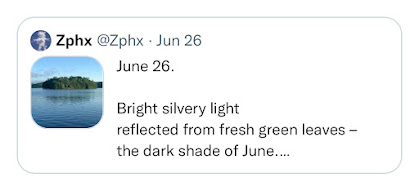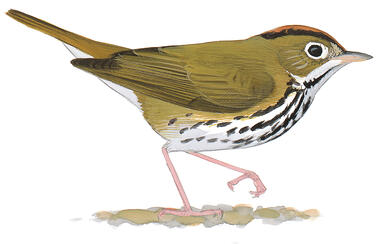June 30.
 |
| June 30, 2014 |
Jersey tea.
Young oak shoots have grown from one and a half to three or four feet, but now in some cases appear to be checked and a large bud to have formed.
Poke, a day or two.
Small crypta Elatine, apparently some days at least, at Callitriche Pool.
Rubus triflorus berries, some time, — the earliest fruit of a rubus.The berries are very scarce, light red, semitransparent, showing the seed, — a few (six to ten) large shining grains and rather acid.
Lobelia spicata, to-morrow.
H. D. Thoreau, Journal, June 30, 1854
Jersey tea. See June 29, 1853 ("Jersey tea, just beginning.")
Young oak shoots have grown from one and a half to three or four feet, but now in some cases appear to be checked and formed a large bud. See May 26, 1854 ("Some young red oaks have already grown eighteen inches, i. e. within a fortnight, before their leaves have two-thirds expanded. They have accomplished more than half their year's growth, as if,. . . now burst forth like a stream which has been dammed. They are properly called shoots.”); May 25, 1853 ("Many do most of their growing for the year in a week or two at this season. They shoot - they spring - and the rest of the Year they harden and mature,. . .")
Rubus triflorus berries, some time, — the earliest fruit of a rubus. See May 21, 1856 ("Rubus triflorus abundantly out at the Saw Mill Brook”); June 7, 1857 ("Rubus triflorus still in bloom"); June 25, 1854 ("A raspberry on sand by railroad, ripe."); July 6, 1857 (“Rubus triflorus well ripe.”); July 2, 1851("Some of the raspberries are ripe, the most innocent and simple of fruits”); July 11, 1857 ("I see more berries than usual of the Rubus triflorus in the open meadow near the southeast corner of the Hubbard meadow blueberry swamp.. . .They are dark shining red and, when ripe, of a very agreeable flavor and somewhat of the raspberry's spirit.") See also A Book of the Seasons, by Henry Thoreau, the Raspberry
Lobelia spicata, to-morrow. See July 19, 1856 ("On the under side of a Lobelia spicata leaf, a sort of loose-spun cocoon, about five eighths of an inch long, of golden-brown silk, beneath which silky mist a hundred young spiders swarm")




















